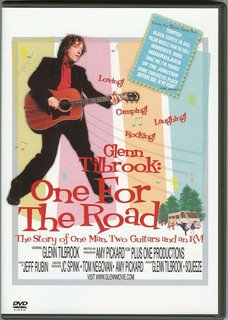 Glenn Tilbrook used to be the frontman for one of the greatest pop acts of the last 40 years - Squeeze. He also co-wrote some of their classic songs. He is something of a musical genius, I'd have thought, along with Chris Difford.
Glenn Tilbrook used to be the frontman for one of the greatest pop acts of the last 40 years - Squeeze. He also co-wrote some of their classic songs. He is something of a musical genius, I'd have thought, along with Chris Difford.It therefore comes as something of a shock to learn he is now a 48-year-old guy who travels across the dusty back roads of America in an RV, staying at campsites and playing gigs of 100 or less, often putting out his own records - you thought poets had it penurious!
Redemption may be around the next hairpin curve, or up the junction: a new film, out today on DVD, from maverick, indie, okay, fannish cineaste Amy Pickford - One For The Road. It follows Tilbrook on his Quixotic tour of the States, and finds much comedy in the pathos. May it bring Glenn some well-deserved cash. That'd be cool for cats.
http://www.quixoticrecords.com/gt_albums.html
Comments